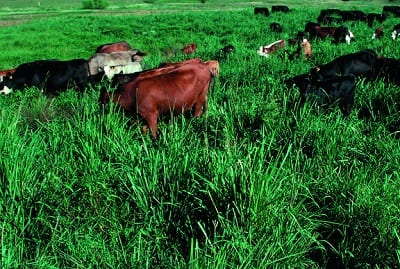Grants awarded to switchgrass biofuel research project
October 27, 2015Scientists to study plant’s effectiveness as an alternative energy source.
A professor of integrative biology at the University of Texas at Austin, Tom Juenger, will receive two grants totaling to $15 million to study a native prairie grass known as switchgrass, to determine how it can be used as an alternative source of energy. More specifically, the study will focus on biofuel research.
It is believed that switchgrass can become a sustainable source of bioenergy.
According to the University of Texas at Austin’s UT News, Juenger will lead a team of scientists from several institutions that include the HudsonAlpha Institute for Biotechnology, universities, and federal agencies on two projects studying the grass, which is found in the tallgrass prairies across North America.
What makes this particular grass unique is that it is capable of thriving in soils that are not suited for other crops. This makes it not only useful for preventing soil erosion and as grazing for livestock, but it gives it potential as biofuel.
The biofuel research will help scientists understand how switchgrass would perform as an alternative fuel.
 Juenger said that “One of the really interesting things with these grasses is that the climate in which they have found themselves has changed a lot over the last several hundred thousand years.” He added that “As glaciers and climate change occurred, their populations were pushed south. And as glaciers retreated, the populations expanded north.”
Juenger said that “One of the really interesting things with these grasses is that the climate in which they have found themselves has changed a lot over the last several hundred thousand years.” He added that “As glaciers and climate change occurred, their populations were pushed south. And as glaciers retreated, the populations expanded north.”
Switchgrass has amazingly adapted to a diverse range of climates throughout North America. It can be found in the hot and dry environment of Central Mexico and in the snowy regions of Canada. Being able to understand how this grass has been able to adapt to these incredibly different areas and climates, will provide the researches with information about how the grass would perform in future climates and as a biofuel crop in a certain area.
While this isn’t the first time that Juenger and his fellow scientists have studied biofuel applications in relation to swtichgrass, this new research they are conducting will give them greater information about the role of rainfall, soil, genes, and other factors that contribute to the effectiveness of this common grass as an alternative energy .
The multimillion dollar funded biofuel research project has received a five-year grant from the Department of Energy’s Office of Biological and Environmental Research, which will provide $11 million for the university and $4 million for partner institutions. In addition, a $4 million four-year grant was also awarded to the team of scientists from the National Science Foundation (NSF). The grant-funded research will begin this fall.

 With over 15 years of reporting hydrogen news, we are your premier source for the latest updates and insights in hydrogen and renewable energy.
With over 15 years of reporting hydrogen news, we are your premier source for the latest updates and insights in hydrogen and renewable energy.